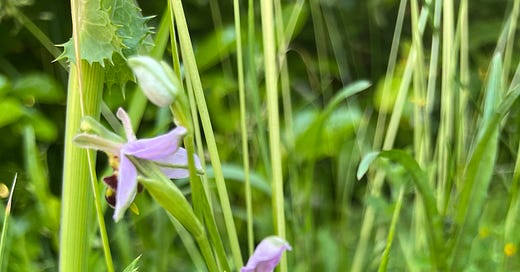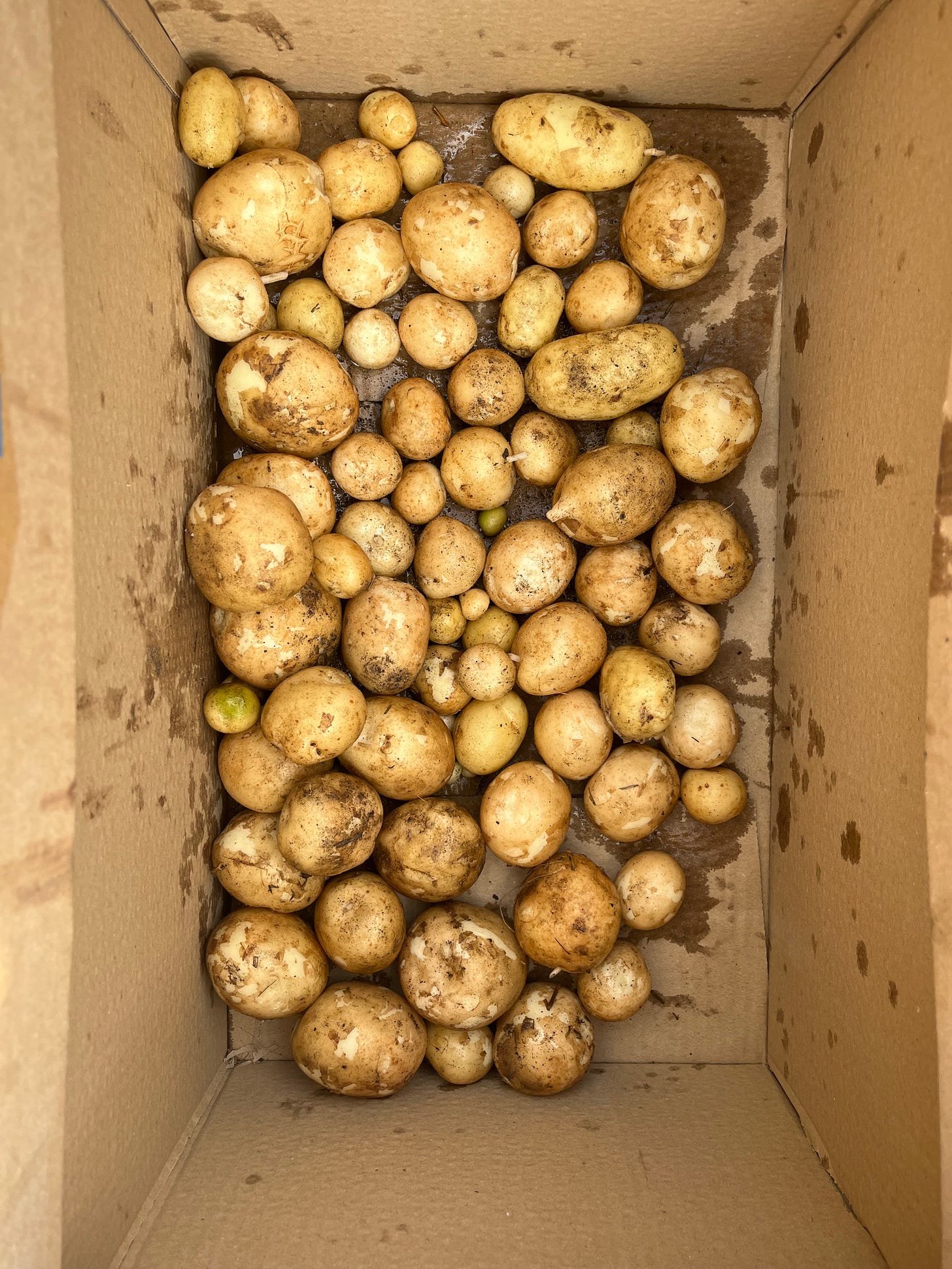8/6
The morning is bright and windy, fresh after the showers and thunder of yesterday. I decide to dig the first two rows of first early potatoes to see how they are going. It is a decent crop, enough to fill the bottom of a large wine box. Every time I plant potatoes it feels like spellcasting, like planting a magic bean or something. From one potato planted in the ground you get many in a matter of weeks. There are about another eight rows of first earlies to dig, and then about six rows of second earlies. I will dig another few rows next weekend, and so on over the next month or so. As space in the bed is freed up it will be replanted with squashes and courgettes. The soil where the potatoes has been is beautiful and rich. It was fertilised with chicken manure and ash over the winter, and having the potatoes first seems to mellow it, break it up a little. The first new plants, which have been growing in the greenhouse, go in as soon as I’m sure I’ve dug up all the potatoes.
Afterwards I cut back some of the hawthorn overhanging the greenhouse. There is an elder tree as well, growing between the greenhouse and the fence, that will need to be carefully removed. I’ve noticed that the interior of the greenhouse has been getting shadier. I wash off as much of the green algae that has built up on the glass as I can. It’s a job I’ll pick up again when I have a moment, but the inside of the greenhouse looks better for it.
At about five we go for a walk up to the top and back. The swallows seem to be everywhere today, but are spectacular when we reach the track along the top fields. They skim the rye at speed then zoom into a climbing bank before falling back into a fast traversal of the field. Everything about them seems evolved for speed and agility.
We spot a couple of muntjac deer, almost invisible in the long grass of the field edges, and entirely unbothered by our presence.
More rain arrives as we get back to the house. It is still much needed. Despite the recent weather the tractor ruts along the top were mostly dry.
9/6
I spend the day marking first year creative writing in my office. A couple of the portfolios contain nature writing, and it is impressive to see how students have crafted pieces that use nature as a launching point for reflective acts of storytelling grounded in the environment.
After work, Ceci and I venture out into the lanes. The sky is hazy, a result of high pressure effectively putting a lid on the air around us, trapping dust and pollen. Sure enough we haven’t gone very far before my eyes and throat become itchy. A couple of American air force F-15s are thundering around overhead, using their afterburners with gratuitous abandon. The chiffchaffs and robins try to compete. Do birds sing loader in noisy places, we wonder? Before we reach the track to the ‘the top’ we turn around. The pollen and the noise isn’t making the walk very pleasant. Even so, we spot roe deer in three separate fields.
From the verges we add to our list of strangely named wildflowers with Spotted Ladies Thumb. The ladies would have to be extremely small with very delicate hands, but I can just about see the resemblance in the flower’s shape. Each bloom consists of delicate dots of pink and white, creating the spotted effect, and forming an intricate oblong cluster.
10/6
Just before midnight I move from room to room to turn out the lights and catch a glimpse, through the cottage windows, of the moon, its light vast and buttery as it rises behind the large oak tree that grows over the hen run.
11/6
After we have eaten, I go out to water the vegetable bed, pots, and the plants in the greenhouse. The beans have suddenly found new zest and are climbing rapidly up the poles. The squashes I transplanted outside on Sunday are looking settled, and have already stretched out their leaves, spreading themselves to the sun. The sky is pale blue above me, the sun about to set. There are mares tails directly overhead—cirrus uncinus. I think it means a warm front is approaching, rain in a day or two. The skin on my bare arms pricks now and then with freezing pin-drops of rain.
13/6
A heat builds all day in thick heavy air. I am still marking coursework, checking in with colleagues online, emails and portals, everything digital. I’m driving my eldest daughter to and from her summer job as she doesn’t have a licence yet. The drive cuts into the day, so I make up the time working in what should be lunchtime, or in the early evening, or on days I’m not contracted to work. The good thing about a job like mine is the flexibility, the bad thing about it is how far that flexibility can stretch into my own time, into evenings and weekends.
Despite the heat the hens have gone into the henhouse by the time it is dusk. They know a storm is coming. Normally on hot nights several of them roost out in the open, and I have to gather them under the wings of my elbows to deposit in the hen house. Not tonight. The sky has slowly hazed over, towering cumulus bunching like distant mountains to the south.
The first thunder comes at midnight. The cats are antsy. They don’t want to be left alone in the family room and Pumba, who has worked out door handles, makes quick work of escaping. I lie awake listening to the rolling thunder grow closer and louder, the dark room strobing with lightning, abrupt moments of flash bulb luminescence, or prolonged flickers followed by deep percussions. One is so loud that the house trembles, the lampshade’s adornments suddenly chiming. The rain arrives like a monsoon, a curtain of noise on the tiles and windows. The hair on my arms rises with the static and I wonder what would happen if the house was struck. I think of the bombs and missiles falling on Tehran and Tel Aviv, of all the millions of tonnes of explosives to have fallen in Gaza and Ukraine, of the great noisy terror of it, of the moral emptiness of the logic that drives it, of the futility of it all. At some point I fall asleep in my safe bed and when I wake again the alarm clock is blinking a random time and the sky is blue outside.
14/6
The morning is still warm and muggy, but a wind begins to build. It is more comfortable to be outside in the wind than in the house, where the residual heat of yesterday still radiates through the fabric of the building. There is a sky of pale blue and crumbled white cloud. The sunlight wavers. The garden is filled with the sound of chiffchaffs, the hens grumbling in their run, woodpigeons cooing in the copse, and the chattering of sparrows.
I still have marking to complete, but aside from the point that it is a Saturday, it is far too hot to sit in front of a screen. I potter instead, digging up another couple of rows of potatoes, transplanting a courgette plant outside, cutting leaves for a salad, and taking up a few radishes for lunch. Then I get out the long-handled secateurs and begin the endless job of trimming back the laurel hedge that the previous owners planted next to the vegetable beds and fruit trees. If ever the brown bins look empty for collection day, we attack the laurel. One day I’d like to get rid of the whole thing and replace it with hazel, and to my delight I find that a couple of soft-leafed hazel saplings have already started to colonise, pushing upward from within the dense sappy laurel stems.
When I examine the fruit trees, which have been suffering due to the long dry spell throughout the spring, I notice the only quince on the quince tree has gone. The tree was a bare root sapling when we planted it, and now it is forming a sizeable bush at head height. It blossomed well, so I don’t quite understand why the fruits are not surviving. I’m guessing the torrential rain from the storm last night might have knocked it down, or perhaps a bird has taken it. I search the ground but there is no sign in the long grass.
We let the grass and wildflowers grow long beneath the fruit trees, in part for the wildlife but mostly from not having time to cut it. Last year there were bee orchids, but they haven’t returned this year. Perhaps it has been too dry.
Many thanks to those of you who have upgraded your subscriptions to support my writing on here. Thanks are also due to those Substackers recommending this page: History, Landscape, Birds, and Stories; Hinterland; All My Old Haunts; The Guild of Master Procrastinators; Another Disappointing Walk, and Some Flowers Soon.
If you’d prefer not to upgrade but would still like to show your financial appreciation, you can also use my Stripe tip jar.
About ‘This Party’s Over’
On ‘This Party’s Over’ I publish my creative non-fiction, personal essays, place writing, and a country diary. My ‘Another Country Diary’ pieces are my most regular posts (about three a month).
The country diary can express a sort of local distinctiveness, explore a personal set of interactions with a landscape, and in doing so, almost accidentally, tease out the way the natural world is entwined with culture and politics. It can be a quietly radical and uncanny form, or sometimes just plain parochial, oddball in its specificity.
If you enjoyed this post, then follow the link to the last one to read more, and, if you are feeling in the mood to, like, share, and subscribe for free.
Another Country Diary #29
This Party's Over is a reader-supported publication. To receive new posts and support my work, consider becoming a free or paid subscriber.







The most terrified I've ever been was tent camping in the mountains of Arizona, high up in the peaks among tall pines, when a nighttime thunderstorm passed over us. Wind, thunder, lightning, torrential rain, and even through all of that the creak and sway of the trees was audible. I wanted to dig myself into the ground. It passed, we were safe, but I have never forgotten that feeling.
I’ve also wondered if birds sing louder in noisy places and found out that they do!
“They sing louder and longer in noisy cities. And they will raise their voices to a higher pitch to make themselves heard over the low-frequency rumble of traffic and machinery.”
https://open.substack.com/pub/anotherdisappointingwalk/p/five-starling-review?r=911oa&utm_medium=ios